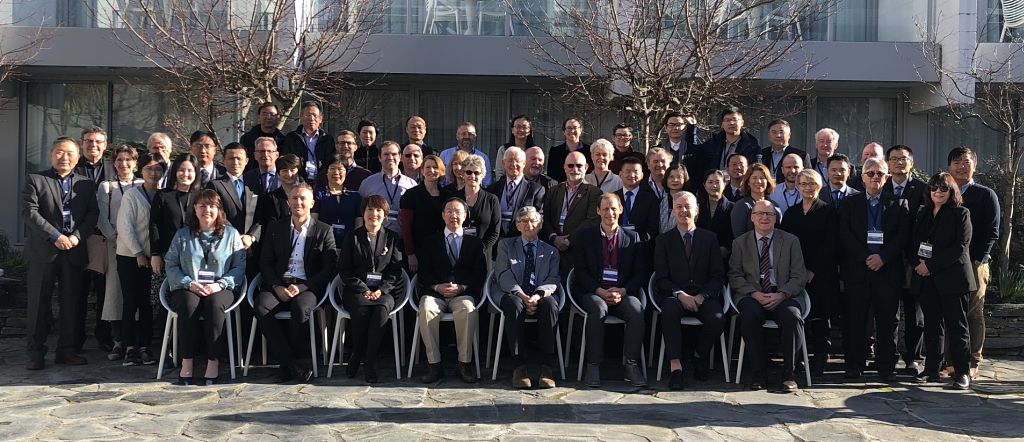Over 60 New Zealand and Chinese health scientists gathered in Queenstown on 30 August – 1 September 2019 to advance their collaborative work studying the brain and illnesses such as stroke, Parkinson’s and dementia, and to explore potential collaborations for modernising traditional medicines.
The forum was hosted by the New Zealand – China Non-Communicable Disease Research Collaboration Centre (NCD CRCC), with support from the China National Centre for Biotechnology Development, Brain Research New Zealand (BRNZ), the University of Otago School of Pharmacy.
NCD CRCC Director, University of Otago Professor Jim Mann says, “Our Centre has established close ties with researchers in China. For instance, we have signed a number of Memorandums of Understanding with Shanghai institutions over the past three years that has led to generous funding from the Shanghai Science and Technology Commission to research Alzheimer’s disease and psychosis, and gout in collaboration with Chinese scientists. We’re facilitating this symposium to help grow NZ-China research relationships in the areas of brain research and in the study of traditional medicine. “We’re building on a growing relationship of trust between the science communities of both our countries, for the long-term health benefits of people in New Zealand, China and world-wide.”
BRNZ Co-Director, University of Otago’s Professor Cliff Abraham says, “Researching brain disease is a long-term project. The more we engage with other international experts to address major issues, the faster we can get results for New Zealand and the rest of the world. We can’t do it all ourselves. “We have already had initial conversations with China, planting the seeds. Now, we are moving towards developing relationships and projects. The end goal, disease treatments, may take a long time. The brain research discussion focussed on Parkinson’s, stroke, Alzheimer’s – all diseases that are difficult to address, but not insurmountable.”
Existing collaborative relationships were strengthened at the forum, such as that between Professor Jian Wang of Huashan Hospital, Fudan University, Shanghai, who is a Deputy Director of the Department of Neurology, and Professor Tim Anderson, Clinical Director of the New Zealand Brain Research Institute and Otago School of Medicine neurologist.
Professor Wang says, “We began our collaboration one year ago. From Tim’s side, he is researching the field of eye movement detection and analysis in Parkinson’s disease patients, seeing how to make better diagnoses. I bring the technology of AI, artificial intelligence. We motion capture the motor function tests of patients with Parkinson’s. I work with the company, Tencent, which also produces the Chinese social media platform, WeChat. The aim is that the Tencent people can help us quantify the motor task dysfunction of Parkinson’s patients.”
Professor Mann says China is beginning to see the disease effects of ageing and changing lifestyles, e.g. dementia, stroke, diabetes, obesity and heart disease, which New Zealand has experienced for some time. The work of world-class New Zealand researchers in these areas, plus New Zealand laboratories use of English, the western scientific method, and ethics guidelines contribute to China’s interest in health research cooperation with New Zealand, along with long-term, high-level political and trade ties between the two countries.
The forum consisted of two discussion groups, one focusing on brain research and the other on modernisation of traditional medicine.
University of Otago School of Pharmacy Associate Professor Arlene McDowell, says, “Both China and New Zealand have seen long-term use of traditional medicines in human and animal health. As a group, our research is looking at innovative ways to make medicines more efficient. We are using cutting-edge science to do this. In China’s case, traditional medicine encompasses acupuncture, therapeutic massage and herbal medicines. At this forum, we’re learning about each other’s research areas and this will help us identify links we can develop. “The talks at this forum have emphasised our shared knowledge, for example, in using compounds from plants in medicines, and it has underlined how engaged and committed we are regarding the collaboration.”
China’s Chengdu University of Traditional Medicine Associate Dean Professor Pei Jin says, “Chengdu University is famous for its work in natural product research. We focus on researching herbs, their chemicals and pharmacology, designing medicines for the market, but we want to improve our outcomes. We have begun a collaboration with New Zealand and found that the plants in our countries have common characteristics. “In October this year, University of Otago researchers will be coming to visit us, and we will discuss establishing undergraduate and postgraduate exchanges and research. Our emphasis is on education and research, especially in the area of chronic diseases. Co-operation with New Zealand researchers has a good future.”

